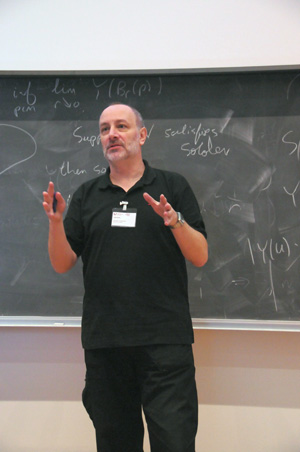A view from the Collaborations Workshop - Hugh Glaser
Posted on 10 March 2011
A view from the Collaborations Workshop - Hugh Glaser
 The DevCSI project sponsored a number of key developers to attend the Collaborations Workshop. We hear from one of these developers, Hugh Glaser (pictured right), who talks about his experience of the workshop.
The DevCSI project sponsored a number of key developers to attend the Collaborations Workshop. We hear from one of these developers, Hugh Glaser (pictured right), who talks about his experience of the workshop.
Never having been to a Collaborations Workshop, I was not very sure what to expect – but Mahendra (from the DevCSI project) seemed to think I might be of some use, so I toddled along. Arriving at the registration and coffee, it was clear that this would be pretty interactive, and although as far as I could tell most people had more history between them than I, I knew a few from e-Science and other application meetings I had been to.
There were very few talks on the agenda, and these were scheduled to be very short, so I think no-one got the chance to fall into the passive mode that can happen in such meetings. After a welcome from Simon we had some “words from the sponsors”, which were of course very pertinent, and then it was straight into the Lightning Talks. Everyone got a strict 5 minutes, but in fact the bell never rang the first day. Perhaps because people were restricted to one slide, they made a story that was to the point. Personally I like short talks like this – it gives me the chance to get a high-level view of what a significant number of people are doing. And in the context of a workshop like this, with a very flexible agenda, anything of particular interest can be taken offline, or added as a breakout session if a group is interested. The other thing for me was, as a bit of an outsider, I quickly got a good feel of who the other participants were, and what they were doing and/or interested in.
Possibly because I was a bit of a latecomer, I had failed to register an interest in doing a talk; however, Simon and Steve managed to squeeze me in. This was very helpful, as otherwise, as a technology provider, I would have had to go round to people explaining what I had to offer, and see if that was anything they thought was useful to them.
So I quickly made a slide on sameas.org and rkbexplorer.com (squeezing two screenshots on one slide), and stood up and offered my services. I would guess that quite a few people had no idea what I was talking about, as I assumed some understanding of Linked Data, RDF and URIs, etc. But that was OK – the aim was to tell people who might be using those sort of technologies that I might have something that would be useful to them.
I was pleased to get some interest afterwards, and was moved to suggest the next day that I might use one of the parallel breakout sessions to do a demo and have a discussion on sameas.org. I really enjoyed that (always enjoy talking about my stuff with interesting people!), and I think there may be some people who will follow up and use the technology.
Of course, there were lots of other things that happened, as well as some really fun discussions a little too late at night in the bar about putting the world to rights. It is always good to listen to others talk about their research and research culture, and it helps to go back and question your own. For example, one session started me thinking of managing my research collaborations as a traditional CRM (Customer Relationship Management), and even using such software – not sure I will, but interesting.
Finally, I think that pointing out to those who did not already know, the success of the UK government and Public Sector data publishing based around a “5 star” model and the CKAN catalogue, might have been helpful, in relation to getting people to publish scientific data. Maybe the stars would need modifying for that, but such badges often make a significant change. And a simple way of providing a catalogue might well bypass the concerns people have about putting the actual data elsewhere.
So thanks to those who organised and funded this – good food for thought for me, and very enjoyable.
